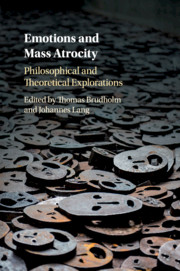Book contents
- Emotions and Mass Atrocity
- Emotions and Mass Atrocity
- Copyright page
- Contents
- Contributors
- Acknowledgments
- 1 Introduction: Emotions and Mass Atrocity
- Part I Causes and Dynamics
- 2 Mass Exterminations and the History of Emotions: The View from Classical Antiquity
- 3 Fear, Hope, and the Formation of Specific Intention in Genocide
- 4 The Proud Executioner: Pride and the Psychology of Genocide
- 5 Pondering Hatred
- 6 Social Science and the Study of Perpetrators
- Part II Emotional Responses
- Part III Repair and Commemoration
- References
- Index
4 - The Proud Executioner: Pride and the Psychology of Genocide
from Part I - Causes and Dynamics
Published online by Cambridge University Press: 16 March 2018
- Emotions and Mass Atrocity
- Emotions and Mass Atrocity
- Copyright page
- Contents
- Contributors
- Acknowledgments
- 1 Introduction: Emotions and Mass Atrocity
- Part I Causes and Dynamics
- 2 Mass Exterminations and the History of Emotions: The View from Classical Antiquity
- 3 Fear, Hope, and the Formation of Specific Intention in Genocide
- 4 The Proud Executioner: Pride and the Psychology of Genocide
- 5 Pondering Hatred
- 6 Social Science and the Study of Perpetrators
- Part II Emotional Responses
- Part III Repair and Commemoration
- References
- Index
Summary
- Type
- Chapter
- Information
- Emotions and Mass AtrocityPhilosophical and Theoretical Explorations, pp. 64 - 80Publisher: Cambridge University PressPrint publication year: 2018



